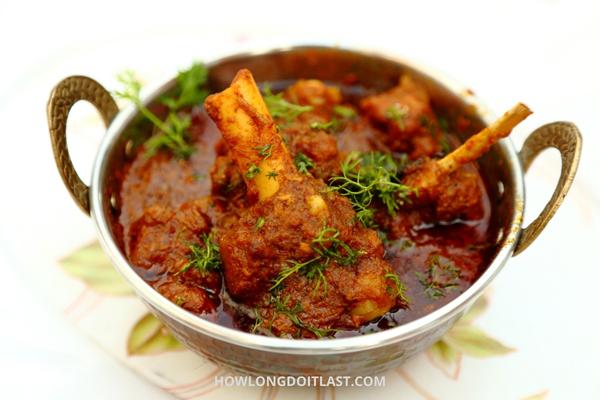How Long Does Curry Last? [in Fridge, Freezer]

Curry is one of the most interesting and delicious food items that has grown in massive popularity in the USA.
And the first thing we need to remember is that there are thousands of curry recipes not just from India but most of east and south-east Asia.
You can make curry by using any ingredient, vegetables, Tofu, cottage cheese, chicken, fish, etc.
It may be confusing at times to know how long for sure each type of curry would last.
If you are someone facing similar kinds of problems, then you landed on the perfect page.
I am here to answer all your queries about how long curry lasts and how we can store it for better preservation.
Did you know: That the word Curry has its origins from a tamil word called “kari”.
Don’t have time here’s a quick table
| Counter | Fridge | Freezer | |
| Curry | 1 to 2 hours | 5 days | 3 months |
| Chicken Curry | 1 to 2 hours | 4 to 5 days | 3 to 4 months |
| Mutton Curry | 1 to 2 hours | 2 to 3 days | 3 months |
| Fish Curry | 2 hours | 2 to 3 days | 3 months |
| Coconut Curry | 2 hours | 2 to 3 days | 3 months |
How long does Curry last in Fridge?
Curry has its speciality in its spices. Spices are the core of each and every curry.
Storing them properly is a vital need. The best option to keep any type of curry fresh and safe is by storing it in the fridge.
Different ingredients are used to make curry, such as marinated chicken, beef, fish, mutton, etc.
Each type of curry has a different shelf life. This is because of the use of different meat, fish, spices, and other ingredients
A normal vegetable curry would last around 4 days in the freezer.
If you have made chicken curry, make sure you use the freshest ingredients. If stored properly, your chicken curry can last up to 4 to 5 days in the fridge.
Mutton and fish curry seems to be one of the favorite curries of most people I have observed. They both have a similar kind of shelf-life when stored in the fridge.
Both curries last for about 2 and a maximum of 3 days in the fridge.
If you are preparing a coconut-based curry, then its shelf-life would be 3 days if stored in the fridge.
If you want your curry to last longer, then storing them in the freezer is the best option. It can be any type of curry, and it would last around 3 months in the freezer considering that you stored it in adequate conditions.
How long does Curry last at Room Temperature?
Curry is something that is loved by people all around the world. It surely is a part and heart of lots of parties and generally spends a lot of time at room temperature which can at times lead to its spoilage.
Hence, knowing the shelf of different types of curries at room temperature will help you to preserve them more properly.
Chicken, fish, tofu, coconut or any kind of condiment such as tamarind or tomato, all types of curry cannot last long at room temperature.
The maximum that they can go to and the time advised by USDA is 2 hours.
After this time, your curry will start getting contaminated by bacteria, which will spoil the curry.
Even if you are storing your curry outside, ensure it is in considerably cooler areas.
And once you are done with the curry, better store it in the fridge or freezer as soon as possible.

Can you Eat Leftover Curry?
Curry has a lot of perishable ingredients such as cream, tomato puree, vegetables, meat, and so on. Even some people prefer goan salt cured meat to make curry.
Hence, whether you can eat leftover curry depends on how and where you have stored your curry in the fridge.
If you have stored your curry in the fridge, you can eat your leftover curry.
But, if you have forgotten to store your curry in the fridge, and left the bowl of curry on the counter, then I am afraid you will have to throw it away.
This is because even if it smells and looks good, it has gone bad. Please do not eat the curry, especially the ones that have meat in them.
How to Store Curry to Maximize Freshness & Minimize Cooking Times?
Storing curry is much simpler than actually making the curry. You just need to know some basics, and you will be all good to go.
Firstly, before transferring or storing your curry anywhere, let the curry cool down properly.
If it’s not at normal room temperature while stored, the moisture can lead to bacterial contamination even if stored in the fridge.
Once it is at room temperature, transfer it to a glass or a plastic container that can be properly sealed and air-tight.
If you also store your curry of any type in a good quality plastic bag.
If you have some leftovers or are planning to eat curry within 3 to 4 days, then store them in the fridge.
If you have made curry in bulk, then you will consume it for a short time and then store it in the freezer.
One trick that I use quite often is you can pre-make the base of the curry, such as the tomato base. You can make it in extra quantities with all the spices and store it in the freezer.
In this way, you can easily make any type of curry. You just have to add the vegetables or the meat that you want to this base, cook it and you will be all ready with the curry.
How to know if Curry has gone bad?
The saddest part about curry is that however delicious it is and how much effort we take to preserve it, curry will eventually go bad.
Here are some cues to recognize signs of spoilage in different types of curry.
If your curry has a foul smell, whether chicken, fish, or coconut, it is one the biggest indicators that it has gone bad.
If your chicken or fish is slimy and way too mushy, it is a sign that the curry has gone bad.
You should not consume it if you can see visible discoloration often occurring in Coconut curries.
Lastly, if you see any mold or fungi growing on top of your curries, be it any type, you know it is better to throw it away.
Conclusion
I hope I have answered all your queries regarding how long curry will last and how can you store it for better preservation.
Remember Safe eating is Fun eating.

![How long does Macaroni Salad last? [Shelf Life, Storage Tips]](https://howlongdoitlast.com/wp-content/uploads/2023/04/How-long-do-Macaroni-Salad-last-.jpg)


![How long do Cinnamon Rolls last? [Storage Methods]](https://howlongdoitlast.com/wp-content/uploads/2022/11/How-long-do-Cinnamon-Rolls-last.jpg)
![How long does a Salad last? [Shelf Life & Storage Tips]](https://howlongdoitlast.com/wp-content/uploads/2023/05/How-long-do-Salad-last-.jpg)

